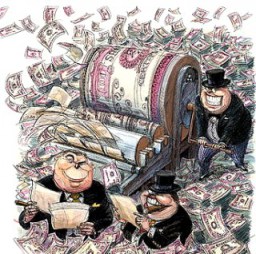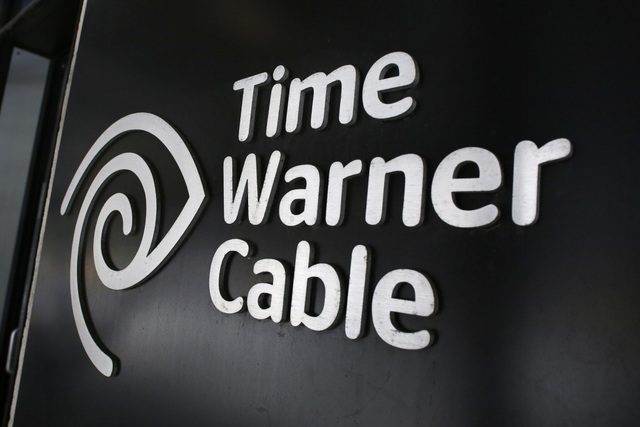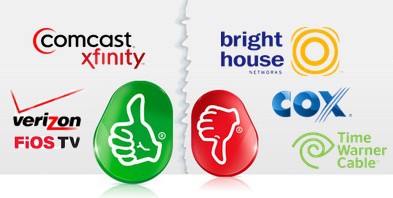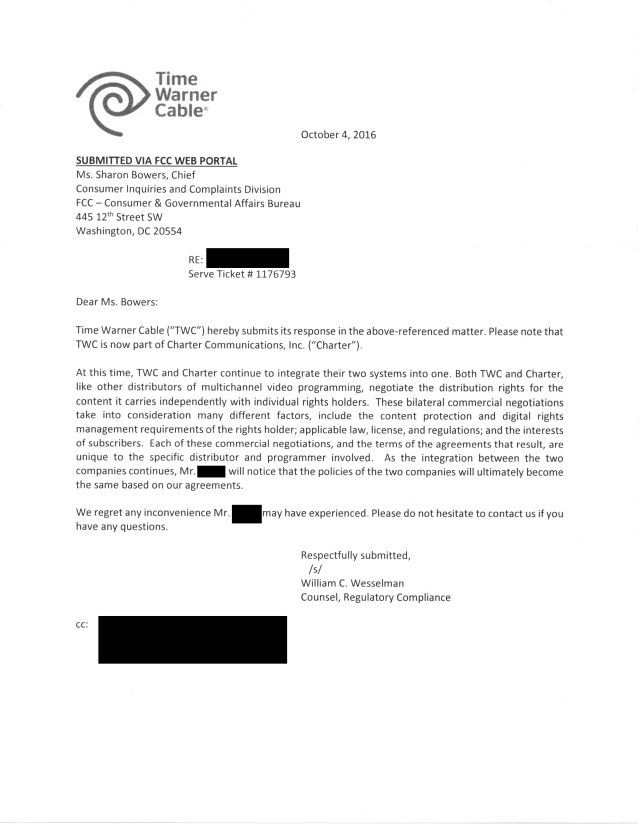 Charter Communications is taking a hard line against extending promotional pricing for Time Warner Cable and Bright House Networks customers and Wall Street predicts a major exodus of customers as a result.
Charter Communications is taking a hard line against extending promotional pricing for Time Warner Cable and Bright House Networks customers and Wall Street predicts a major exodus of customers as a result.
UBS analyst John Hodulik predicts Charter’s new ‘Just Say No to Discounts’-attitude will result in customers saying ‘Cancel’ and he estimates a massive loss of at least 75,000 Time Warner Cable television customers in the third quarter as a result, with many more to follow.
Charter Communications’ executives have ordered a hard line against giving existing customers discounts and perpetually renewing promotional pricing, a practice Time Warner Cable has continued since the days of the Great Recession to keep customers happy.
Time Warner Cable and to a lesser extent Bright House have learned antagonized, price-sensitive customers were increasingly serious about cutting cable’s TV cord for good when the cost becomes too high to justify. Time Warner Cable dealt with this problem by giving complaining customers better deals, often repeatedly. That mitigated the problem of customer loss, allowed the company to retain and grow cable television customers and even helped minimize the practice of promotion shopping common in competitive service areas.
For years, Time Warner and Bright House customers learned they could enroll in a year-long promotion with the cable operator and then switch to a year-long new customer promotion from AT&T U-verse or Verizon FiOS and then jump back to the cable company with a new promotion. In many cases, they even got a gift card worth up to $300 for their trouble. Charter Communications thinks their new “pro-consumer policies” of not charging rapacious equipment fees and sticking to “simplified” prices will delight customers enough to keep their loyalty. Good luck.

Licensed to print money
Wall Street doesn’t believe Charter’s reputation or their ‘New Deal’ for TWC and BH customers will be perceived as making things better, especially for cable television and its cost. As customers roll off promotions at Time Warner Cable, the bill shock of watching rates rise up to $65 a month will speak for itself. The higher the price hike, the more likely it will provoke a family discussion about dropping cable television service for good.
In Los Angeles and Texas, where Charter premiered its new “simplified pricing” for Time Warner Cable customers, the response has been underwhelming, with many customers deriding it as “simply a price hike.”
David Lazarus, a reporter for the Los Angeles Times, characterized the transition from TWC to Charter this way: “Meet the new cable company. Same as the old cable company.”
Culver City resident Jack Cohen provides good evidence of what happens when customers get their first bill from Charter, and it is higher than expected. Cohen received his first bill for $162, $22 more than his last Time Warner Cable bill of $140 a month, because his promotion with TWC expired. As a result, he canceled cable television after Charter wouldn’t budge on pricing. Cohen said “cancel” and never looked back. He now pays the new cable company $40 less than he gave Time Warner Cable, because he now only subscribes to broadband and phone service. Charter’s ‘simplified pricing’ cost the cable company more than the $22 extra they were originally seeking.
Lazarus learned when his own TWC promotional package expires in December, Charter had a great Christmas present waiting… for themselves. Lazarus’ $65 promotion will rise to $120 a month — almost double what he used to pay. But Charter also offered Lazarus a better deal he can refuse, a new Charter-Spectrum package of the same services for the low, low price of $85 a month — still a 30% rate hike.
In Texas, customers coming off promotions are learning first hand how Charter intends to motivate customers to abandon the Time Warner Cable packages Charter promised they could keep — by making them as unaffordable as possible and offering slightly less expensive Charter/Spectrum packages as an alternative.
“But it’s still $45 more than what I was paying Time Warner Cable for the same damn thing,” complained Ty Rogers to a Charter retention specialist, after his Time Warner Cable shot up once Charter took over. He is waiting for Google Fiber to arrive and then plans to cancel everything with Charter.
Charter’s billing practices also are dubbed the weirdest in the cable industry by The Consumerist, because Charter loves to hide taxes, surcharges, and fees by rolling them into other charges on the bill and cannot be accurately accounted for:
Charter breaks out federal, state, or local taxes and fees for some services (TV) but not for others (voice). Also, depending where you live and when you signed up for services, the taxes, fees, and surcharges that do appear may be listed under different sections of the bill or not at all.
While their procedure does result in many fewer line items for consumers, it does produce more confusing bills overall, and make it harder to compare against other providers in a truly apples-to-apples kind of way.
‘No, no, no,’ counters Charter/Spectrum to FierceCable.
“Our internet packages are competitively priced, but we offer faster starting speeds and don’t charge an additional modem lease fee on top of the cost of service (that is an additional $10 at legacy TWC),” Charter spokesman Justin Venech said. “That pricing is better and more attractive to customers. Our video packages are simpler and more robust. For example, our Spectrum Silver package includes over 175 channels plus premium channels HBO, Showtime and Cinemax while a comparable TWC package would have charged extra for premiums. We don’t add on additional fees and taxes to our voice product that our competitors do, and our equipment pricing for video set-top boxes are much lower with Spectrum than our competitors or legacy TWC or BHN. Our new Spectrum pricing is $4.99 for a receiver vs over $11 at legacy TWC.”
“That assumes, like every cable company always does, that we want HBO, Showtime, and Cinemax, don’t already own our own cable modem, and are not dancing in the streets over an even bigger television package filled with crap we don’t want,” said Rogers. “Charter also takes away Time Warner’s excellent long distance phone service, which let me call almost all of Europe without any toll charges or an extra cost calling package. I paid Time Warner $10 a month and could talk to someone in France all night long if I wanted. With Charter, it’s more for less.”
Rogers’ promotion included his DVR in the promotion, so comparing Charter’s $4.99 vs. TWC’s $11 for a DVR made no difference to him either.
“You can argue all day about the ‘value’ you are offering, but you can’t argue your way out of a bill that is $45 higher than last month,” Rogers complained.
Overall, the latest spate of cable mergers and AT&T’s acquisition of DirecTV has been bad news for consumers, who face fewer competitive prospects and a new, harder line on promotional pricing. AT&T customers are discovering AT&T is more motivated to get U-verse TV customers to switch to DirecTV and less interested in providing discounts. The cable competition knows that, making fighting for a better deal much tougher if Charter’s only competitor in an area is AT&T. Cable operators also understand there is a built-in reluctance to switch to satellite by a significant percentage of their customers.
Charter’s pre-existing customers not a part of the TWC/BH merger are not too happy with Charter’s Spectrum offers either. At least 152,000 video customers said goodbye for good to the cable operator’s television packages.
Hodulik predicts there are more where that came from as the rest of the country gradually discovers what Charter has in store for them.
 Charter Communications has announced price changes and new fees for existing Time Warner Cable customers that will take effect Dec. 15, 2016:
Charter Communications has announced price changes and new fees for existing Time Warner Cable customers that will take effect Dec. 15, 2016:

 Subscribe
Subscribe Charter Communications is taking a hard line against extending promotional pricing for Time Warner Cable and Bright House Networks customers and Wall Street predicts a major exodus of customers as a result.
Charter Communications is taking a hard line against extending promotional pricing for Time Warner Cable and Bright House Networks customers and Wall Street predicts a major exodus of customers as a result.
 Charter Communications is wasting no time looking for increased shareholder value by slashing jobs in states where regulators placed few, if any conditions on the acquisition of Time Warner Cable and Bright House Networks.
Charter Communications is wasting no time looking for increased shareholder value by slashing jobs in states where regulators placed few, if any conditions on the acquisition of Time Warner Cable and Bright House Networks.

 Some believed this problem could eventually resolve itself with Charter Communications’ buyout of Time Warner Cable and Bright House Networks. Would Charter bring their own policies to affected TWC/BH customers, or will Charter customers soon have to contend with the CCI CopyOnce flag loved by Time Warner Cable as well.
Some believed this problem could eventually resolve itself with Charter Communications’ buyout of Time Warner Cable and Bright House Networks. Would Charter bring their own policies to affected TWC/BH customers, or will Charter customers soon have to contend with the CCI CopyOnce flag loved by Time Warner Cable as well.
 Arris will manufacture the next generation of set-top boxes for Charter Communications, supporting hybrid IP/QAM video and the legacy technology still in place at Charter-acquired Time Warner Cable and Bright House Networks.
Arris will manufacture the next generation of set-top boxes for Charter Communications, supporting hybrid IP/QAM video and the legacy technology still in place at Charter-acquired Time Warner Cable and Bright House Networks.